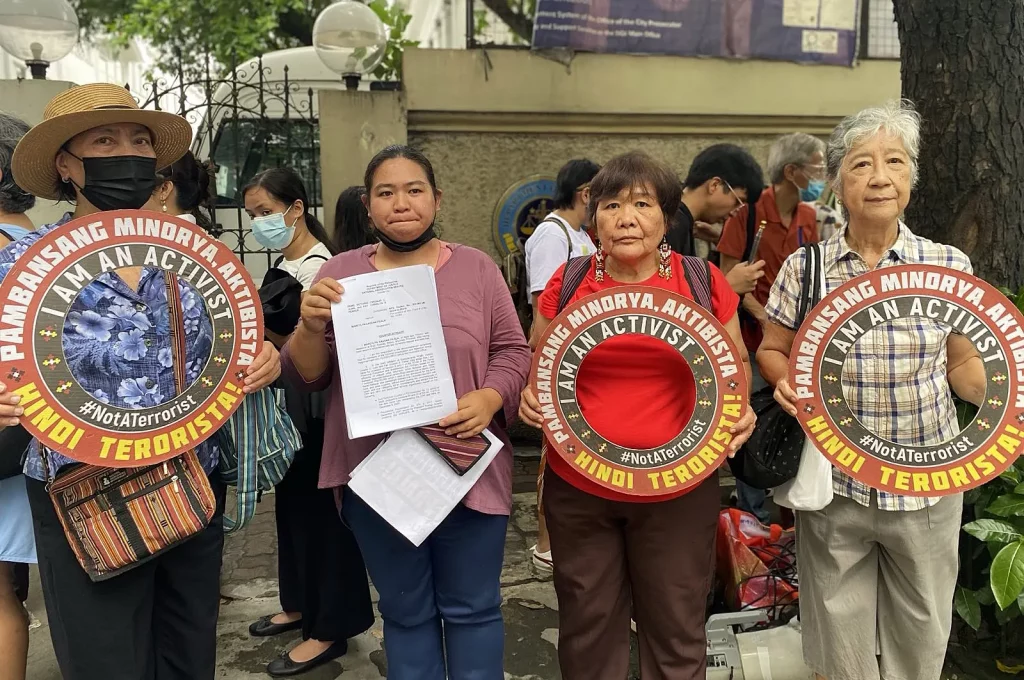By SHERWIN DE VERA
www.nordis.net
BAGUIO CITY—Indigenous peoples’ organizations have joined the growing call for the dismissal of terrorism financing complaints against a storekeeper in the Cordillera, denouncing them as unjust.
Katribu and the Bai Indigenous Women’s Network (Bai) held a protest on Wednesday, October 16, outside the Department of Justice (DOJ) in support of Marcylyn Pilala, a Kankanaey woman from Besao, Mountain Province.
The Criminal Investigation and Detection Group in the Ilocos Region filed the complaint based on the allegations of individuals claiming to be former rebels that she provided groceries to members of the New People’s Army (NPA).
Pilala, a farmer who augments her income working as a shopkeeper for her mother’s small sari-sari store, received a summons from the prosecutor on September 25 for the preliminary investigation.
Accompanied by their counsels from the National Union of Peoples Lawyers, she filed her counter-affidavit with Alaiza Lemita. Authorities charged both women for violating the Terrorism Financing Prevention and Suppression Act (TFPSA) of 2012.
Lemita is accused of providing rice and adobo to the NPA. Her sister was one of the victims of “Bloody Sunday,” a coordinated police and military operation in Southern Tagalog in March 2021 that resulted in the deaths of nine activists and the arrest of six others.
The Anti-Terrorism Council has designated the NPA, along with the Communist Party of the Philippines and the National Democratic Front of the Philippines, as “terrorists.” A Manila Regional Trial Court junked an earlier petition filed by the DOJ to proscribe the CPP and the NPA as terrorist groups.

Human rights concerns
The protesters argue that the charges are part of a disturbing trend of legal actions targeting indigenous women and rights advocates. Human rights groups have raised concerns over the use of TFPSA and the Anti-Terrorism Act (ATA) of 2020 to criminalize ordinary activities.
The laws stem from UN Security Council Resolution 1373, which requires countries to criminalize the financing of terrorism and implement measures to prevent terrorism. However, rights groups have raised concerns about the overly broad definition of terrorism, the provisions on asset freezing, and related sanctions, which they argue have a chilling effect on human rights defenders.
Katribu National Convener Beverly Longid condemned the charges, stating that even everyday livelihood activities, such as selling food, are being framed as crimes under these laws.
“This case exposes the absurdity of the law including the Anti-Terror Act, where even simple endeavors like selling food or providing meals can be distorted into crimes,” she said.
She also questioned the integrity of the evidence used in such cases, which often rely on testimony from alleged former rebels.
“The DOJ’s increasing reliance on testimonies of self-proclaimed former rebels against activists and critics is alarming. By accepting these witnesses without proper investigation, the DOJ allows for more victims of trumped-up charges like Pilala and Lemita,” Longid added.
One of the many cases
The Bai Indigenous Women’s Network said the charges violate Pilala’s right to work under the Convention on the Elimination of All Forms of Discrimination Against Women and the 2022 General Recommendation No. 39 on the Rights of Indigenous Women and Girls.
Bai Co-Spokesperson Maureen Loste said the case represents “another attack on Indigenous women and advocates who are simply exercising their rights.”
She cited the cases of Manobo Julieta Gomez and Lumad rights defender Niezel Velasco, whom the police and military arrested and detained on trumped-up charges. She also mentioned Kalinga women leader Betty Belen, who was previously charged with illegal possession of firearms and explosives, a case that the court later dismissed.
The groups called for the immediate dismissal of the charges against Pilala and Lemita and the repeal of the TFPSA and ATA. They warned that unless these laws are repealed, more indigenous and rural women may face unjust charges under the pretext of counterterrorism. # nordis.net

